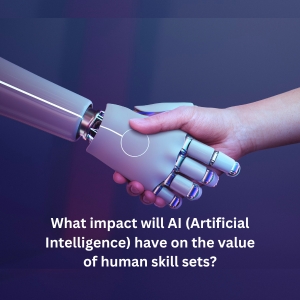What impact will AI (Artificial Intelligence) have on the value of human skill sets?Posted by Atul on September 8th, 2023  Introduction to AI (Artificial Intelligence) and Human SkillsAs we enter into a world of automation, the question of human skills versus Artificial Intelligence (AI) arises. With disruptions in the job market, companies are turning to Artificial Intelligence (AI) to enhance their competitive advantage. But what impact will AI have on the value of human skill sets? When it comes to automation, robotics technology and AI are taking over jobs in many different sectors from retail and medicine to transportation and agriculture. This automation displacement puts pressure on workers who lack the skills needed for more advanced roles that require specializations. Companies are outsourcing more routine tasks to machines which means that humans must develop higher levels of skills or risk being replaced by robots and artificial intelligence. At a high level, AI has an impact on human capital by offering machines that can perform complex tasks without the need for human intervention. According to a report by McKinsey & Company, “AI is expected to be one of the most disruptive technologies of this century” with an estimated trillion in potential global economic value over the next 12 years. This automation is beneficial at reducing business costs, and providing access to previously inaccessible data and insights. Definition of AI and Human Skill SetsAI has the potential to take over any duty that involves a set of instructions that can be programmed into a machine. This includes customer service, data mining, and even basic administrative tasks like writing emails or filling out forms. Cognitive and motor skills are harder to replicate in machines, however, because they require judgment. Ultimately, the question we must ask ourselves is what impact will AI have on the value of human skill sets? The answer lies in recognizing the unique aspects of both AI and human skill sets. AI has been proven to enhance humans in their ability to analyze more complex problems faster and with greater accuracy; but it cannot yet think critically or provide judgment on its own—that is where humans come in! Humans possess unique skills that can’t be replicated by machines — such as empathy — which makes us invaluable partners in many professional fields such as healthcare or education where these cognitive abilities are necessary for success. We can use technology to our advantage if we take the time to recognize the value of both AI and human skill sets — that way we can find ways to work together rather than against each other. Review of Human Skill SetsCreativity has always been a hallmark of humans that separates us from technology and machines. Human creativity cannot be automated and remains indispensable for certain tasks such as brand building, storytelling, product design, and user experience development. As we move forward into the future, creative professionals should be able to differentiate themselves from AI by honing their craft and unique style. On the other hand, many knowledge economy jobs which require specific competencies or technical abilities can be automated with AI technology. This means that those who wish to stay ahead in terms of employability must focus on transferable skills – those which can be applied across different roles and industries such as problem solving, critical thinking, communication, and data analysis. While many people worry about automation advancements displacing them from their jobs – it is important to keep in mind that there is still a distinction between human capabilities and artificial intelligence’s capabilities. Machines lack autonomy – they can only do what they were programmed or taught to do while humans are able to think outside of conventional boundaries; this ability is crucial when it comes to tackling complex problems that require advanced conceptualisation skills or foresight. Benefits and Potential Consequences of the Integration of AI in BusinessesThe integration of Artificial Intelligence (AI) technology into the business world has already begun to trigger transformations in a variety of different industries. AI-driven automation offers the potential to streamline operations, optimize resources, and enhance customer service. These advancements are enabling businesses to increase productivity and efficiency in multiple ways. As AI continues to become more commonplace, it’s important to consider what impact this will have on the value of human skill sets. On one hand, AI could prove beneficial by providing humans with more leisure time as mundane tasks are taken over by machines; however, it could also threaten wages and job security for many workers if they don’t have highly specialized skills that can’t be replicated by robots or algorithms. This is particularly relevant considering that it is estimated that nearly half of all current occupation activities could already be automated using existing technology. For those with specialized skill sets, this could mean an increase in demand; however, for those without such specialized expertise there is potential danger that their jobs will no longer exist or will be replaced at lower wages due to automation or cheaper labor overseas. Full Stack Development Course Edinburgh Impact on Job Security and Employment RatesFor one thing, automation has become an increasingly common tool for businesses, displacing some human labor in the process. This means that some jobs may become obsolete as machines take over duties that used to require a person. But all is not lost—human skill sets still have value in the labor market, even with increased automation coming into play. Businesses still need people who possess capabilities such as creative problem solving, communication skills and emotional intelligence—things machines simply cannot replicate (yet). Another key point to consider is that while AI disruption of traditional job roles may be concerning in the short term, it could also create new opportunities in the long run. Automation will free up people’s time from mundane tasks and enable them to focus on higher value activities which drive innovation and progress. Finally, when evaluating how businesses should adapt their strategies for the age of AI, adaptability and reskilling should be taken into account. People need to stay abreast of changes in technology if they want to remain competitive in the job market and employers must focus on creating programs that empower their staff with uptodate skill sets. investment banking course Edinburgh Different Types of Skills That Will Become Increasingly Valuable with AI AdvancementWhile AI can certainly do a remarkable job at completing specific and repetitive tasks, there are certain skills that cannot be replaced by digital technology. In order to remain competitive in the job market in this increasingly digitized world, it is important to understand what types of skills will become increasingly valuable with the rise of AI. One such skill is human creativity. Despite the impressive advances made in AI development, machines and algorithms are unable to generate ideas that are unique and imaginative from scratch. Human creativity remains an invaluable asset for any workplace, as having innovative ideas can help find solutions to complex problems across various industries. Another important skill is emotional intelligence, which refers to a person’s capacity for exploring their own emotions as well as those of other people. With this capability comes an understanding of others’ needs and motivations and how to effectively communicate with them. Critical thinking is another essential skill that machines can’t replicate on its own; even if an algorithm can identify patterns within data, it still cannot make sense out of that data or connect it to other datasets in order to solve larger problems efficiently. Therefore, training yourself in effective critical thinking allows you to process information more quickly and arrive at potential solutions with greater accuracy than any machine could offer. Examples How Artificial Intelligence Is Transforming Current WorkplacesAI promises greater levels of automation which can help free up human capital to be invested in more complex tasks. It can also improve efficiency by streamlining and standardizing processes across the workplace. This frees up employees from mundane tasks so that they can focus on optimizing processes and responding quickly to changing customer demands. The flexibility offered by AI technology is also improving the workplace environment as it allows for rapid response to customer demands while providing more accurate data analysis and decision making capabilities. This leads to improved productivity and better problem solving skills among workers. By using AI, companies can also save time and money on hiring new employees, thereby reducing overall costs and increasing profits. Of course, these advances in AI technology come with some challenges too. While the value of human skill sets may still remain intact, they may need to adapt to this new environment in order to remain relevant. Workers need to stay ahead of the curve when it comes to understanding new technologies so they can use them effectively for their own development or for their employer’s benefit. Like it? Share it!More by this author |


